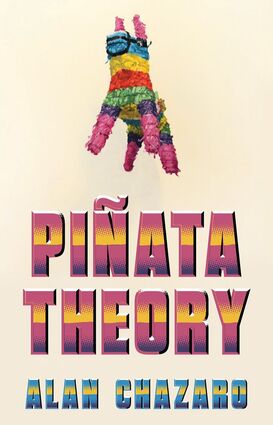Piñata Theory by Alan Chazaro is a collection of poetry, a collection of memory, a collection of what it was and is like to be a Mexican-American. Chazaro has moments of sincere examination—“Lucha Libre, in Two and ½ Parts,” a poem which is split into two and a half parts, is an example in which he explores how he may have turned out had he been raised in Mexico instead of the United States. He writes: “Mexican For the non-Spanish speakers, what Chazaro is saying is: Mexican me might’ve been more ready than American me, might’ve loved more easily than American me. In this we learn the epicenter, the foundation, for most of the poems is a search for identity. Chazaro thinks: What if I stayed? What if I were raised in Mexico? Who would I have been? These are valid questions for anyone raised outside of their home country. As a person who was born in a foreign country but raised in the US, I too think about this often. Who would I be if I was raised in a different country? Hopefully, the reader will also wonder who else they could have been, were they born somewhere else. In this same poem, Chazaro grapples even further in a breathtaking revelation; “I was born in Redwood City, but my mom tells me I was born This situation is so fascinating; a just in case being a Mexican birth certificate. It is such an unusual detail, why would his mother think he may need it? It is only one of the many interesting elements which make up Piñata Theory. Chazaro is also one to play with form—multiple poems are broken into sections, and it works well to tell a story and make a point. And it is done in an effective way. Read “Lucha Libre, in Two and ½ Parts,” or “Clinica Xalapa / Visiting Hours,” or the title piece, “Piñata Theory,” for a zesty multiple-part poem. Each of the poems tells Chazaro’s personal story; the reader may find it mirrors their life story as well. Chazaro has split the collection into sections—“Body,” “Break,” and “Gather”—strategically categorizing everything. He tactically crafts line breaks, like in “Burning Etcetera”: “For as far as I could drink The way the lines are broken puts emphasis on “things” and “wargrounds,” as well as the “aries foxholed.” This creates a powerful image; this is only a small hors d'oeuvre of great line breaks which can be found throughout the collection.
This collection contains poems which will resonate in the reader’s mind; poems like “A Millennial Walks into a Bar and Says:,” “Ode to Kendrick Lamar,” “Before Being Deported,” and “Notes on Gentrification” are about identity and humanity and how they have affected Alan Chazaro, and whether you were born in the US or elsewhere, they are well worth the read.
0 Comments
Leave a Reply. |
Archives
April 2024
Categories
All
|
|
Glassworks is a publication of Rowan University's Master of Arts in Writing 260 Victoria Street • Glassboro, New Jersey 08028 glassworksmagazine@rowan.edu |
All Content on this Site (c) 2024 Glassworks
|


 RSS Feed
RSS Feed
